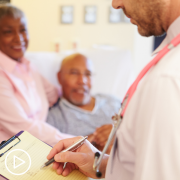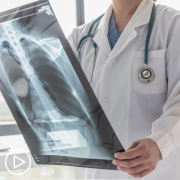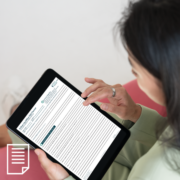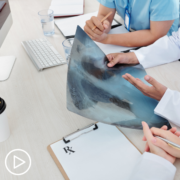Empowering Lung Cancer Patients to Increase Their Treatment Options
Empowering Lung Cancer Patients to Increase Their Treatment Options from Patient Empowerment Network on Vimeo.
How can lung cancer patients be empowered to increase their treatment options? Experts Dr. Nicole Rochester and Dr. Olugbenga Okusanya explain ways to improve access to lung cancer treatments and to process information more completely for the best care.
See More from Best Lung Cancer Care No Matter Where You Live
Related Resource:

|

|
Transcript:
Dr. Nicole Rochester:
If we shift gears a little bit and talk about access and some of the concerns about treatment access for lung cancer patients, we know that sometimes these barriers that patients face actually limit their access to treatments, and you indicated surgery as being the mainstay and some difficulties with that, so how can we empower patients so that they don’t feel limited in their care, and how do we make them aware of these treatment options that are available, so that if they are in an office and maybe something’s being offered, but that’s not actually, the standard of care, how do we empower them to get that information and then to act on it?
Dr. Olugbenga Okusanya:
Yeah, so number one, which is something I think people do and they don’t realize how valuable it is, bring a friend to the appointment, don’t come by yourself, because you are in an incredibly vulnerable position, you’ve learned or are learning something incredibly emotionally charged and usually very scary. So, you want to bring someone who obviously is going to love you and care about you, but has enough emotional distance from it that they can be your advocate, they can ask those questions in the room that you may just not be there mentally to ask. Number two, never be afraid to get a second opinion, if you’re lucky enough to live in a populous area with multiple health systems, get a copy of your chart, get a copy of your data, get your disc, make an appointment to see another specialist in another health system and see what they say. Because at the very least, if the information is concordant, then you’re going to feel pretty good about saying, “Okay, then I should just go where I think I feel best or who I have the best sort of relationship with?” And again, if you are not lucky enough to have that opportunity, I would be very aggressive about seeing if telehealth is an option to reach out to someone who is a specialist, I’ve had not happened to me in the past, I remember I had a woman who telehealth, me from Ohio, because she’d actually read one of my papers about lung cancer, and she sent her scans, uploaded them, I looked at them and I gave her my opinion, and this is the new age or medicine.
This is where we’re at now. This is a viable option, and even if telehealth isn’t an option, you can always just get on the phone. As a lung cancer specialist, a lot of the information I need can be garnered from test scans and images, so frankly, the physical exam has some role, but is not the mainstay of how a lot of the decisions are made. So even if I see your scans and I talk to you, I can give you an opinion over the phone, it takes me 15 to 20 minutes, and a lot of times, those visits may not even be charged, depending on who you actually ask to give you an opinion.
Dr. Nicole Rochester:
I’m a huge proponent of second opinions, I’ve talked to so many patients and family caregivers who think that they’re offending their doctor if they ask for a second opinion, so I appreciate that you brought that to the forefront and you deserve to have multiple opinions as you’re making these very important life-changing decisions.










